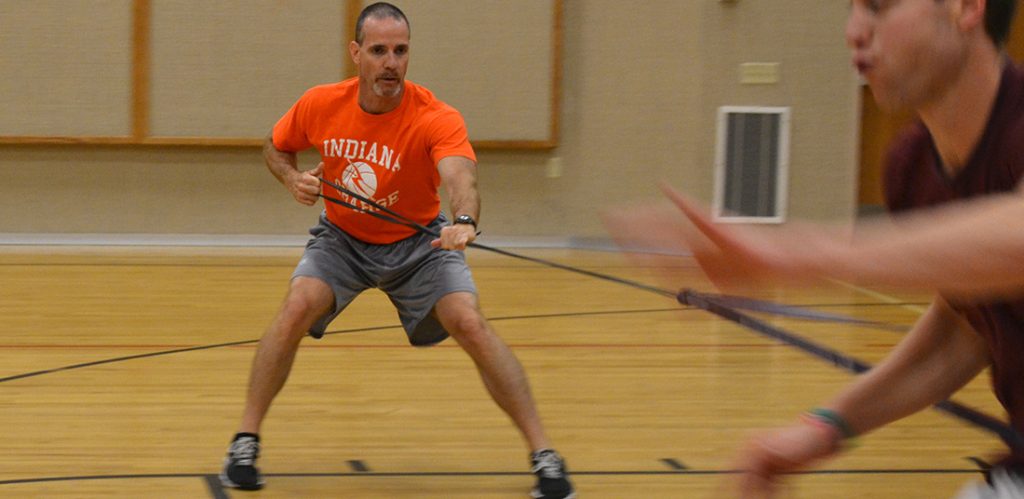When I first began coaching basketball, I developed a set of basketball conditioning drills for my players. I called them the “Final Four” of basketball conditioning drills. There are four drills that are completed on a time frame which somewhat mimic basketball speed, but are slightly longer in duration compared to a normal sequence of plays, at least in the duration of intensity.
These drills are completed in a way that every direction of travel is covered, except for vertical. These 4 basketball conditioning drills are done in such a way the athlete is only allowed a short rest period to stress the anaerobic threshold. The athlete must also work on speed of movement and efficiency while performing all the drills.
The drills below can be completed in a progression according to ability and conditioning level. The first timers may want to do these drills with 2 sets rather than 3. For the more advanced athletes and after a conditioning foundation, resistance can be used with light tubing. This is much more intense even though the tubing may be light. The focus needs to be on resisting the athlete, not assisting or pulling the athlete.
Basketball Conditioning Drills
Here is a description of the basketball conditioning drills and the work to rest ratio:
Drill #1
3 Cone Reaction Drill
- There are 3 cones set up at 4 yards apart. The athlete will be standing 4 yards from the middle cone in an athletic ready position. The coach will either call out a number of the cone (given earlier) or point to the cone he wants the athlete to travel to. The athlete will explode and run to the cone, touch it with the outside hand and immediately shuffle back to the beginning spot. If the coach calls out or points to the next cone while the athlete is at the previous cone, then the athlete will shuffle to the new cone. If a cone is not called out, then the athlete will shuffle back to the start and wait for the next cone.
- The drill will last for 12 seconds
- The rest period will be 24 seconds (1:2 ratio)
- The drill is performed 3 times.
- There will be a 90 second rest before the next drill
- Advanced athletes can add tubing for resistance
Drill #2
V-Drill
- The middle cone of the 3 cone drill is moved back to the starting position of the athlete. This will make a “V” formation. The athlete will start behind the center cone. When the coach says “go”, the athlete will sprint to the right cone, touch it, then backpedal to the start and immediately go to the left cone. The athlete will plant the back foot on the backpedal and immediately redirect and head to the second cone. This pattern continues for the total time.
- The drill will last for 12 seconds
- The rest period will be 24 seconds (1:2 ratio)
- The drill is performed 3 times.
- There will be a 90 second rest before the next drill
- Advanced athletes can add tubing for resistance
Drill #3
Shuffle Drill
- There are 2 cones set up at 5 yards apart. The athlete will start at one cone in an athletic stance. On “go” the athlete will shuffle to each cone touching it with the closest hand. The change of direction needs to be quick and efficient. The athlete doesn’t want to come up high out of the change of direction. The hips need to remain level as the power leg pushes the ground away.
- The drill will last for 12 seconds
- The rest period will be 24 seconds (1:2 ratio)
- The drill is performed 3 times.
- There will be a 90 second rest before the next drill
Drill #4
Forward and Backward Drill
- The final drill is completed using the same formation as the shuffle drill. The difference is the athlete will run forward and backpedal to each cone. The athlete will touch the cone with the closest hand to the cone. The athlete will bend the knees in a good lunge deceleration position when stopping at each cone.
- The drill will last for 12 seconds
- The rest period will be 24 seconds (1:2 ratio)
- The drill is performed 3 times.
- Advanced athletes can add tubing for resistance
When using resistance, make sure the individual holding the tubing and supplying the resistance is experienced. They need to be able to move with the athlete to make sure the athlete doesn’t receive assistance. In this case, the tubing must be taken up for any slack.
It is important that the tubing is used on each side of the athlete. During the shuffle, resist the right side one set and left on the next set. During the forward and backpedal, resist the forward side and backpedal side. The resistance direction can be changed each set or every other workout.
For even more ways to develop your game take a look at…

